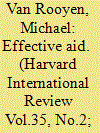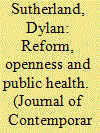|
|
|
Sort Order |
|
|
|
Items / Page
|
|
|
|
|
|
|
| Srl | Item |
| 1 |
ID:
125277


|
|
|
|
|
| Publication |
2013.
|
| Summary/Abstract |
Humanitarian assistance is aimed at providing rapid, life-saving support in settings of high population vulnerability, such as in times of war, disaster, or displacement. The provision of humanitarian assistance is complicated by severe access restrictions, large-scale emergency needs, displaced populations, and complex political and social settings. Both war and disasters create, and often amplify, existing economic disparities and contribute to an environment in which gender inequities, human vulnerabilities, and human rights abuses are likely to be exacerbated. The emergency response to large-scale humanitarian emergencies such as the 2010 earthquake in Haiti creates a sense of public urgency and political pressure to intervene. The last decade has seen significant advances in the standardization and coordination of relief and development activities, including improved mechanisms for coordination and accountability. While these efforts provided a solid basis for improved efficiency, they have faltered in recent large-scale crises. As the global relief and development community contemplates the next decades of humanitarian operations, a few essential questions should be raised: What are the most important barriers to providing effective aid? What future issues must be understood to optimize the efficiency of aid? What is the cost of inaction and what are the ramifications of not changing the system? This article will focus on some of the factors contributing to ineffective humanitarian aid and discuss the progress toward humanitarian reform, including the need for professionalism, coordination, and accountability.
|
|
|
|
|
|
|
|
|
|
|
|
|
|
|
|
| 2 |
ID:
102794


|
|
|
|
|
| Publication |
2011.
|
| Summary/Abstract |
China's HIV/AIDS epidemic today is seen by policy-makers primarily as a biomedical problem. Yet according to many researchers this conceptualization of what causes HIV/AIDS epidemics is restricted, focussing on individual behaviour to the exclusion of the broader economic and social determinants. This paper, therefore, illustrates how considering such determinants, including income and gender inequalities, may complement our understanding of the HIV/AIDS epidemic in China. It does so by using two different examples: the development of commercial sex work and long-distance migration patterns.
|
|
|
|
|
|
|
|
|
|
|
|
|
|
|
|
|
|
|
|
|